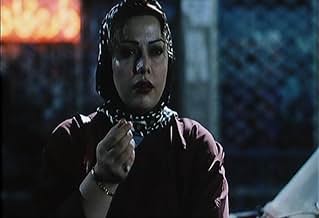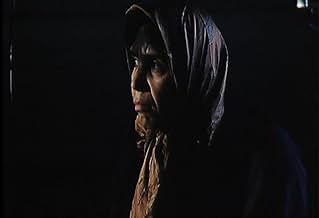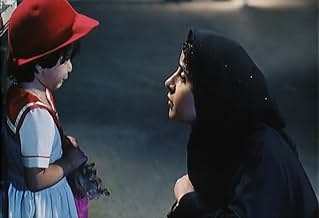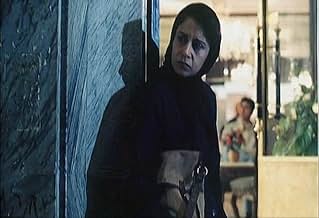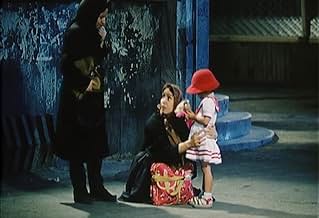PUNTUACIÓN EN IMDb
7,4/10
7 mil
TU PUNTUACIÓN
Añade un argumento en tu idiomaVarious women struggle to function in the oppressively sexist society of contemporary Iran.Various women struggle to function in the oppressively sexist society of contemporary Iran.Various women struggle to function in the oppressively sexist society of contemporary Iran.
- Dirección
- Guión
- Reparto principal
- Premios
- 12 premios y 7 nominaciones en total
Maryiam Palvin Almani
- Maryam Parvin Almani (Arezou)
- (as Maryam Parvin Almani)
Fereshteh Sadre Orafaiy
- Fereshteh (Pari)
- (as Fereshteh Sadr Orafai)
Reseñas destacadas
While reading the various interviews with Jafar Panahi concerning his latest film "The Circle", I noticed that he always stresses the fact that his film is not a feminist film, but a humanist film. I'm reminded of the times I've been in a political conversation with someone and they've said "I'm no feminist but..." and then said something in defense of women's rights. Well, whether he intended it or not, Panahi has made a feminist film, because after all, feminism in its most basic form has nothing to do with hating men, but is merely a desire for the fair and equal treatment of women, and equal human rights is of course a cornerstone of humanism. I'm no scholar (and that I can say in all honesty) but yes, I would say I'm a feminist. I've never been on a march, and I've never read the works of any great feminist theorists, but to the core of my soul I believe in the equal and fair treatment of women, and if that doesn't make me a feminist I don't know what does.
Of course, all this discussion about feminism wouldn't matter if "The Circle" wasn't such a strong film. Panahi's film, almost universally praised, will receive no negative criticism here either. His use of narrative (most reviews compare the narrative style to "La Ronde" [1950], but I suppose comparisons could be made with "The Phantom of Liberty" [1974] and "Slacker" [1990], for that matter) might be perceived by some rob the characters of their individuality, but of course that is part of the point. In Iran today women are all grouped together, Panahi is saying, and they are seen as no more that a collective problem for men to deal with. Ultimately, there is nothing I can say about this film that hasn't been said before, but I wanted a chance to express my appreciation for this extraordinary myself.
Of course, all this discussion about feminism wouldn't matter if "The Circle" wasn't such a strong film. Panahi's film, almost universally praised, will receive no negative criticism here either. His use of narrative (most reviews compare the narrative style to "La Ronde" [1950], but I suppose comparisons could be made with "The Phantom of Liberty" [1974] and "Slacker" [1990], for that matter) might be perceived by some rob the characters of their individuality, but of course that is part of the point. In Iran today women are all grouped together, Panahi is saying, and they are seen as no more that a collective problem for men to deal with. Ultimately, there is nothing I can say about this film that hasn't been said before, but I wanted a chance to express my appreciation for this extraordinary myself.
I have seen several Iranian films in the past few weeks thanks to a short season of the films screened in the UK by Channel 4 a channel that can rise above the level of reality television when it puts its mind to it. Having seen them in a compact space of time, I had quickly gotten it in my head that many of those screened had come to international attention and various degrees of acclaim because they were "issue" films that looked at some aspect of Iranian life with at least a semi-critical eye. However none of them came close to the sort of anger with the system that was evident throughout this film.
The plot sees several stories that weave around one another to produce a film that looks at several women, all of whom are suffering in some way or other due to the general treatment of women in Iran. As a dramatic device it doesn't totally work because too little time is spent with each character to really get to know them or get into their stories and situations, but this struck me as being the film's second aim with the first quite clearly being the injustice with which women are treated. As such, the narrative never really engaged me in terms of the people in the story, but the general picture painted was interesting enough to hold my attention and make me care for the characters generally, even if I would struggle to put names to faces.
The actresses are all pretty good and most come off pretty natural and convincing, with only the odd moment here and there not really working. They all strike a rather tragic note with each of them trying to make out the best they can in life but really oppressed in so many ways whether it is small things like not easily moving in the streets by themselves or being rejected by their families to save honour. The direction is good, with different styles used for some of the characters but done in a subtle way to the point where I didn't notice until somebody pointed it out to me.
Overall this is a good film but not a brilliant one mainly because the narrative comes secondary to the criticism of the system. However it is worth seeing mainly because, without really ranting, it holds a lot of anger at the status of Iranian women and their treatment and the injustice within the system it may not be balanced but it is interesting and engaging.
The plot sees several stories that weave around one another to produce a film that looks at several women, all of whom are suffering in some way or other due to the general treatment of women in Iran. As a dramatic device it doesn't totally work because too little time is spent with each character to really get to know them or get into their stories and situations, but this struck me as being the film's second aim with the first quite clearly being the injustice with which women are treated. As such, the narrative never really engaged me in terms of the people in the story, but the general picture painted was interesting enough to hold my attention and make me care for the characters generally, even if I would struggle to put names to faces.
The actresses are all pretty good and most come off pretty natural and convincing, with only the odd moment here and there not really working. They all strike a rather tragic note with each of them trying to make out the best they can in life but really oppressed in so many ways whether it is small things like not easily moving in the streets by themselves or being rejected by their families to save honour. The direction is good, with different styles used for some of the characters but done in a subtle way to the point where I didn't notice until somebody pointed it out to me.
Overall this is a good film but not a brilliant one mainly because the narrative comes secondary to the criticism of the system. However it is worth seeing mainly because, without really ranting, it holds a lot of anger at the status of Iranian women and their treatment and the injustice within the system it may not be balanced but it is interesting and engaging.
A baby girl is born, and the grandmother regrets for the sex of the baby. Three women are released under probation from the jail and get lost into the crowd, without courage to come back home and having no money. A woman escape from the jail to make an abort and is expelled from her own home by her family. Another woman left her daughter of about six years old alone on the street. A prostitute is arrested with her client in his car, and the man is released by the police later while the woman goes to jail. All of these individuals and disconnected situations are presented to show the repressive situation against the women in the Iranian society. In the end, like in a circle, all of them ends arrested in the jail. I am not aware of the behavior of the Iranian society with their women, but this movie portraits a horrible picture. The women are showed without freedom, depending on her husband or her family even for simple actions, like traveling in a bus. If their society works this way, how are these actresses daily treated after their performances in this movie? The camera and the direction are excellent. It is amazing the capability of the Iranian filmmakers in making simple but touching films. My vote is eight.
Title (Brazil): `O Círculo' (`The Circle')
Title (Brazil): `O Círculo' (`The Circle')
The "circle" in Jafar Panahi's great film is many things: the
structure of the film itself, which ends with the same image it
begins with; a location in Teheran, where a character meets a
friend in a movie theater; the circular stairs so many other
characters run up and down; the circling, hovering camera
movements that bring us face to face with the women in these
interlinked stories and the world they are caught in. Most of all,
perhaps, it is the constricting circle within which Iranian women
must live their lives, the tightly circumscribed rules and
expectations of a rigidly masculine universe. None of Panahi's
characters can escape this circle, though some try and one, at
least, believes that she can. The more experienced know the truth;
all they can do in running is map out the circumference of their
shrunken world.
It's easy to see The Circle as a film about the oppression of
women in Iran, but that would reduce it to the merely political--and
we should not forget that the film was made by an Iranian man,
and that three quarters of the Iranian electorate recently voted to
reelect President Khatami, a deeply intelligent voice for freedom
and dialogue who has had his own difficulties being heard.
Panahi's subject is far larger; a woman who grew up in an abusive
household told me that no other film had so accurately depicted
the experience of her youth, when the constraints on women's
lives were so much taken for granted that she was unaware there
was anything outside them. But those constraints are fatal. We
make our world together, through dialogue and interaction. To
deprive someone of voice and the chance to participate in that
process is to kill them, whether it is done through religious and
social sanctions or by a husband beating his wife. Panahi's
women are neither dead nor silent, even though their only
listeners are other women. Their tragedy finds echoes everywhere;
but in this film where theme and expression are so intimately
joined we, at least, can hear them.
structure of the film itself, which ends with the same image it
begins with; a location in Teheran, where a character meets a
friend in a movie theater; the circular stairs so many other
characters run up and down; the circling, hovering camera
movements that bring us face to face with the women in these
interlinked stories and the world they are caught in. Most of all,
perhaps, it is the constricting circle within which Iranian women
must live their lives, the tightly circumscribed rules and
expectations of a rigidly masculine universe. None of Panahi's
characters can escape this circle, though some try and one, at
least, believes that she can. The more experienced know the truth;
all they can do in running is map out the circumference of their
shrunken world.
It's easy to see The Circle as a film about the oppression of
women in Iran, but that would reduce it to the merely political--and
we should not forget that the film was made by an Iranian man,
and that three quarters of the Iranian electorate recently voted to
reelect President Khatami, a deeply intelligent voice for freedom
and dialogue who has had his own difficulties being heard.
Panahi's subject is far larger; a woman who grew up in an abusive
household told me that no other film had so accurately depicted
the experience of her youth, when the constraints on women's
lives were so much taken for granted that she was unaware there
was anything outside them. But those constraints are fatal. We
make our world together, through dialogue and interaction. To
deprive someone of voice and the chance to participate in that
process is to kill them, whether it is done through religious and
social sanctions or by a husband beating his wife. Panahi's
women are neither dead nor silent, even though their only
listeners are other women. Their tragedy finds echoes everywhere;
but in this film where theme and expression are so intimately
joined we, at least, can hear them.
Iranian director Jafar Panahi's Golden Lion winner of 2000, "Dayereh", is a critical and extremely powerful film about women who suffer from the injustices of the laws of the Islamic Republic.
As an atheist I support no religions, and I do not think one is better or more respectful to human lives than any other. "Dayereh" is a film that is concerned with religion only as far as it is a film that takes place in Iran, a country where Islamic Law dominates or even rules over the secular law. I am not an expert on Iranian law, but I do hold "Dayereh" to be the TRUTH, not a propaganda fiction of no concern to reality. Therefore, I admire Iranian directors who constantly produce magnificent films although they have to battle against censorship and the strict rule of the Ayatollah. This perhaps forces filmmakers to adapt a more poetic film semiotics, perhaps only suggesting cruelty and injustice, not showing it directly like Western directors are allowed to do.
Like Mohsen Makhmalbaf and Abbas Kiarostami before him, Jafar Panahi has succeeded in producing a small, but superb film. Kambuzia Partovi's script is great, linking the misfortune and fates of several young Iranian women together into a whole narrative. All four or five women (one is not as thoroughly described) have committed unlawful acts, but their crimes are not explicitly stated in the dialogue of the film. However, we understand that their crimes would not be considered near a crime in most other countries, because it is related to sex and female independence, not to real criminality. Bahram Badakshani's camera is always close to the women, and their acting is nothing less than brilliant. The tracking movement of the camera and the shots composed by a hand-held camera result in many long takes, where the actresses get to show their skill wihtout editing. This is also a marvellous success for the director Panahi.
This film also contains a subtle symbolic factor, namely the wish for several of the women to smoke a cigarette. Different interruptions and laws concerning females and cigarettes prevent the women to smoke until one of the last scenes, when a women is arrested for travelling alone in a car with a man to whom she is not married (prostitution?). When a male prisoner is lighting up his cigarette, the woman does the same, and this time no one stops her. The smoking of the cigarette is not a symbol of freedom, because all the young women end up back in prison, but the cigarette does create a symbol of escape, although it is an escape from society, and not from the persecution of women who act like human beings (in Iran, read men). The smoking becomes Virginia Woolf's room of their own, the escape from a society that does not want them to be free.
As an atheist I support no religions, and I do not think one is better or more respectful to human lives than any other. "Dayereh" is a film that is concerned with religion only as far as it is a film that takes place in Iran, a country where Islamic Law dominates or even rules over the secular law. I am not an expert on Iranian law, but I do hold "Dayereh" to be the TRUTH, not a propaganda fiction of no concern to reality. Therefore, I admire Iranian directors who constantly produce magnificent films although they have to battle against censorship and the strict rule of the Ayatollah. This perhaps forces filmmakers to adapt a more poetic film semiotics, perhaps only suggesting cruelty and injustice, not showing it directly like Western directors are allowed to do.
Like Mohsen Makhmalbaf and Abbas Kiarostami before him, Jafar Panahi has succeeded in producing a small, but superb film. Kambuzia Partovi's script is great, linking the misfortune and fates of several young Iranian women together into a whole narrative. All four or five women (one is not as thoroughly described) have committed unlawful acts, but their crimes are not explicitly stated in the dialogue of the film. However, we understand that their crimes would not be considered near a crime in most other countries, because it is related to sex and female independence, not to real criminality. Bahram Badakshani's camera is always close to the women, and their acting is nothing less than brilliant. The tracking movement of the camera and the shots composed by a hand-held camera result in many long takes, where the actresses get to show their skill wihtout editing. This is also a marvellous success for the director Panahi.
This film also contains a subtle symbolic factor, namely the wish for several of the women to smoke a cigarette. Different interruptions and laws concerning females and cigarettes prevent the women to smoke until one of the last scenes, when a women is arrested for travelling alone in a car with a man to whom she is not married (prostitution?). When a male prisoner is lighting up his cigarette, the woman does the same, and this time no one stops her. The smoking of the cigarette is not a symbol of freedom, because all the young women end up back in prison, but the cigarette does create a symbol of escape, although it is an escape from society, and not from the persecution of women who act like human beings (in Iran, read men). The smoking becomes Virginia Woolf's room of their own, the escape from a society that does not want them to be free.
¿Sabías que...?
- CuriosidadesPanahi adopted a different camera style to depict each of the four main protagonists' lives. For the first, an idealistic woman he used a handheld camera. For the second woman, the camera is mounted on a constantly moving dolly. The third woman's story is told at night in darker outside, and the camera is static with pans and tight close ups. For the last, least optimistic woman both the camera and the woman are completely immobile and very little sound is used.
- ConexionesFeatured in Cinema Iran (2005)
Selecciones populares
Inicia sesión para calificar y añadir a tu lista para recibir recomendaciones personalizadas
- How long is The Circle?Con tecnología de Alexa
Detalles
- Fecha de lanzamiento
- Países de origen
- Sitio oficial
- Idioma
- Títulos en diferentes países
- The Circle
- Localizaciones del rodaje
- Empresas productoras
- Ver más compañías en los créditos en IMDbPro
Taquilla
- Presupuesto
- 10.000 US$ (estimación)
- Recaudación en Estados Unidos y Canadá
- 440.554 US$
- Recaudación en todo el mundo
- 756.035 US$
Contribuir a esta página
Sugerir un cambio o añadir el contenido que falta


